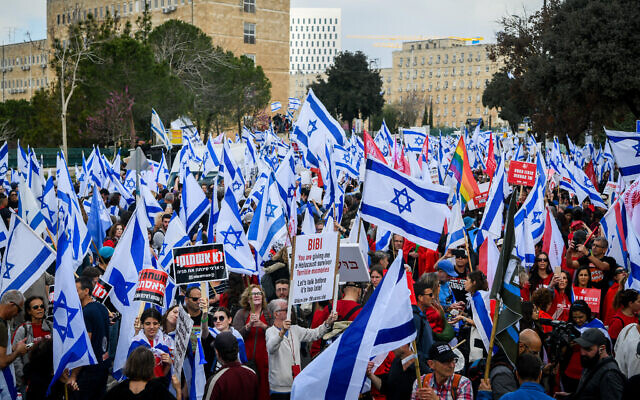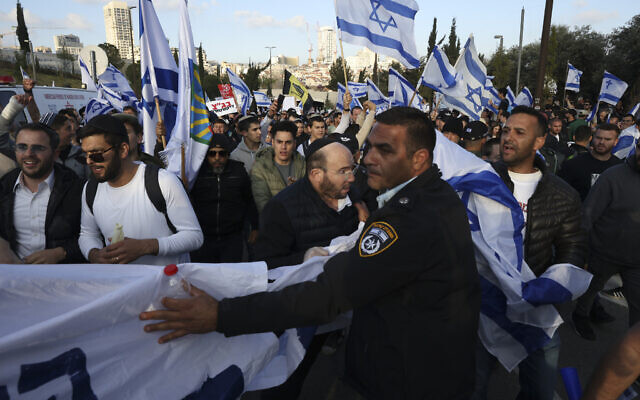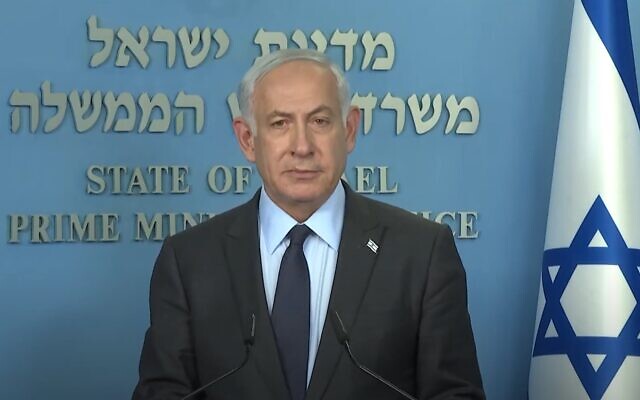ISRAEL
Over 100k at Knesset as PM delays planned speech; right organizes counter-protest
Netanyahu, expected to announce halt to overhaul, urges demonstrators on both sides to avoid violence; Lapid tells protesters: ‘No government will take our rights’
Masses rallied across Israel on Monday ahead of an expected announcement by Prime Minister Benjamin Netanyahu that he was halting judicial overhaul legislation in the face of skyrocketing opposition.
In Jerusalem, some 100,000 people protested outside the Knesset, as right-wingers organized a counter-protest which drew a few thousand people. In Tel Aviv, a group of demonstrators ran onto the Ayalon Highway, temporarily blocking traffic at Hashalom Interchange. Protests were also held in Haifa and Beersheba.
Police chief Kobi Shabtai arrived to the site of the protests outside the Knesset Monday afternoon, taking a tour of police activity at the site alongside Jerusalem District Commander Danny Levy.
Separately, a group of protesters briefly shut down the entrance to Jerusalem near the Chord Bridge junction. Police said that three demonstrators were arrested when they cleared the road.
As the nation waited for Netanyahu’s address, the premier offered a brief statement in which he called on “protesters in Jerusalem, from the right and left, to act responsibly and without violence.”
The prime minister had originally been expected to speak in the morning, but his address was delayed again and again as he huddled with coalition leaders, amid reported threats by Otzma Yehudit leader Itamar Ben Gvir to quit, and as Religious Zionism chief Bezalel Smotrich called on the right to show up in droves for the pro-overhaul rally. Justice Minister Yariv Levin, after fighting tooth and nail in recent weeks against a halt to the legislation he led, said it was now up to Netanyahu to decide how to proceed.
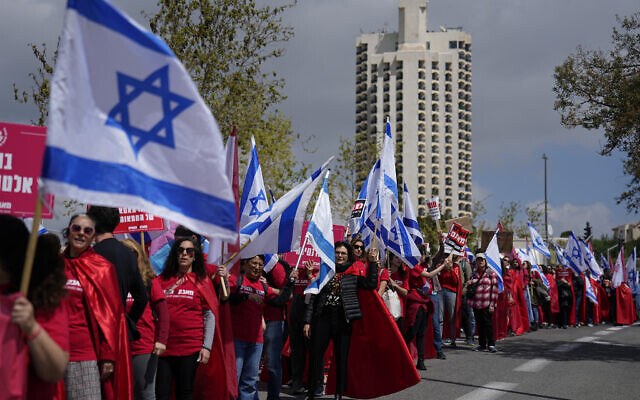
The fresh rallies came after Netanyahu fired Defense Minister Yoav Gallant Sunday evening for publicly calling to pause the shakeup, a move that led to major overnight protests throughout the country and particularly in Tel Aviv, followed by declarations by the Histadrut labor federation and others of a general strike.
Amid the burgeoning unrest, a Knesset committee approved for its final plenum readings a highly contentious bill that would give the coalition broad control over the selection of judges and the Supreme Court chief — even as the premier appeared poised to mothball it.
Opposition leader Yair Lapid told demonstrators outside the Knesset that “no government gave us our rights and no government will take our rights.”
“There is one thing that the extremists in the government didn’t take into account: You,” he told the gathered demonstrators. “We won’t shut up and we won’t rest until the State of Israel has a constitution.”
Lapid said: “If they want us to live here together, they need to respect our values.” And likening protesters’ democratic values to a religious lifestyle and pro-settlement priorities, he added: “What’s holy to us is not less important than what’s important to them.”
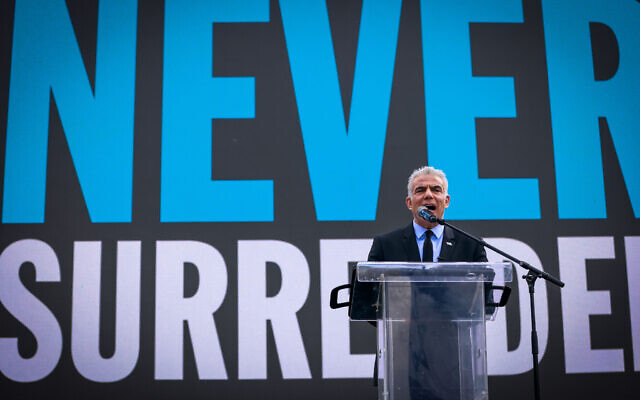
Outside the Knesset, a former army colonel lay the blame for the current societal upheaval squarely on Netanyahu.
“This started with some cigars and now we’re defending democracy,” Ofer Burin said, in reference to one of the charges against Netanyahu in his ongoing trial — of illegally receiving gifts from wealthy business tycoons in return for regulatory actions benefiting them.
“That’s the situation. It’s all because of Netanyahu, it’s like [Finance Minister Bezalel] Smotrich said, he’s a ‘lying son of a liar.’ That’s his legacy. The Likud party needs to set him aside and then we can talk. You can’t talk with someone you don’t trust,” said Burin, who lives in Herzliya.
“My parents made aliyah from Argentina. I am happy they are in their graves so they don’t have to see what’s happening here now, and I am here to make sure we don’t end up with a dictatorship like they had in Argentina for seven years.”
A group of physicians and other medical professionals also took part in the protest while wearing red or purple T-shirts with logos identifying them as doctors and mental health professionals.
Nadav, a psychiatrist at a Netanya hospital, said he attended the protest outside the Knesset in order to defend democracy for the sake of the Israeli healthcare system.
“In non-democratic states, the public healthcare system does not work as it does in Israel. Basic rights like the equality of patients’ access to care could be hurt,” he said. “I treat people with addictions and from the margins of society. They could lose their protections.”
Hadar Rozenman said she came to the Knesset from Tel Aviv to “fight for democracy and stop this crazy legislation,” which she said threatened the foundations of the country.
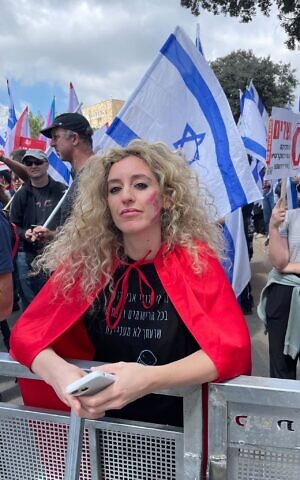
“We can already see this happening with all these personal laws which are for Netanyahu’s benefit. That’s what dictators do,” she continued, referring to a bill to allow Netanyahu to keep large cash gifts to fund legal bills for his criminal trials, and a bill to allow Shas leader Aryeh Deri to return to the cabinet after the High Court banned him from ministerial office in January due to his prior criminal convictions.
Rozenman rejected labeling the protest movement as left-wing, pointing out that many in the protest movement are from the right, and stating that she had voted for Likud until 2019.
“We can have legal reform but you don’t do a reform… in a couple of months in order to get someone appointed minister again after they were convicted of crimes, or to pass the ‘legal gifts’ law,” said Rozenman.
Meanwhile, a number of coalition lawmakers — including from Netanyahu’s Likud party — urged supporters of the government and its judicial revamp effort to attend the pro-overhaul demonstration in the evening near the Knesset.
The rally, which appeared to draw around 2,000 people as of early evening, was dubbed an “emergency” event, due to Netanyahu’s expected announcement of a legislative pause or halt.
“The elections won’t be stolen from us,” declared a poster for the rally, reflecting proponents’ sentiment that the overhaul’s opponents, through mass protests and threats to stop volunteering for reserve military service, had managed to overturn the right’s victory in the November election.
“We must not give up on the people’s choice,” it added.
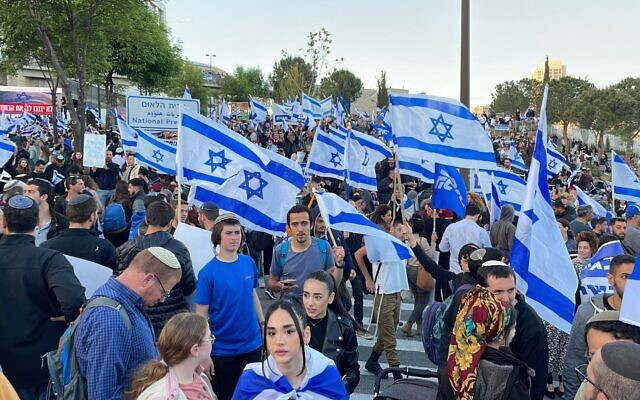
The protest was held between Sacher Park and the Supreme Court, near the Knesset. Organizers of the pro-coalition rally arranged shuttles to Jerusalem from across the country, including from numerous settlements.
Many chanted “the people want judicial reform,” while some also shouted: “Where were you in Gush Katif,” recalling Israel’s settlement bloc in Gaza before the 2005 Disengagement.
Some who arrived at the pro-government protest heckled those attending the anti-overhaul rally, including some young men who shouted: “You’re whores, what kind of equality of rights are you talking about, leftist whores!”
Others sought to reason with each other, debating the points of the legislation.
“You need to remember diversity is the answer to everything,” one supporter of judicial change said to an anti-overhaul demonstrator, arguing in favor of the coalition’s push to diversify the High Court, which critics say will politicize it.
“We keep electing right-wing, but getting left-wing decisions,” he added, echoing a common refrain on the right.
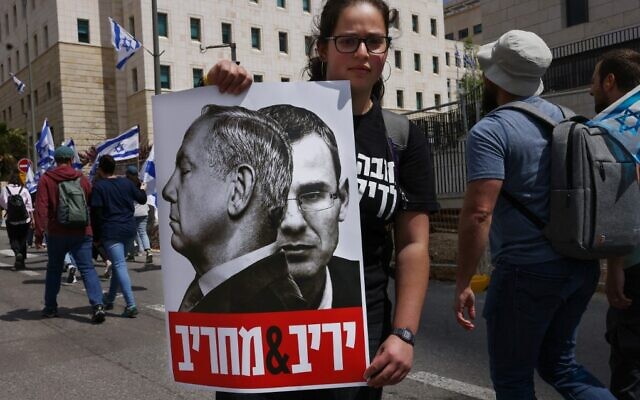
La Familia, a group of ultra-nationalist soccer fans who back Jerusalem’s Beitar FC, announced it would attend the protest outside the Knesset. “Until now we have stayed quiet,” said La Familia, which has a history of violence during its activities.
Expecting clashes between the two major rallies, police announced additional officers would be deployed to the area.
The latest anti-overhaul demonstrations were part of an unprecedented nationwide “week of paralysis” aimed at upending daily life in the country, which protest leaders declared last week.
Weekly mass protests have been held for nearly three months against the planned legislation, which critics say will politicize the court, remove key checks on governmental power and cause grievous harm to Israel’s democratic character. Proponents of the measures say they will rein in a judiciary that they argue has overstepped its bounds.
Renee Ghert-Zand contributed to this report.
